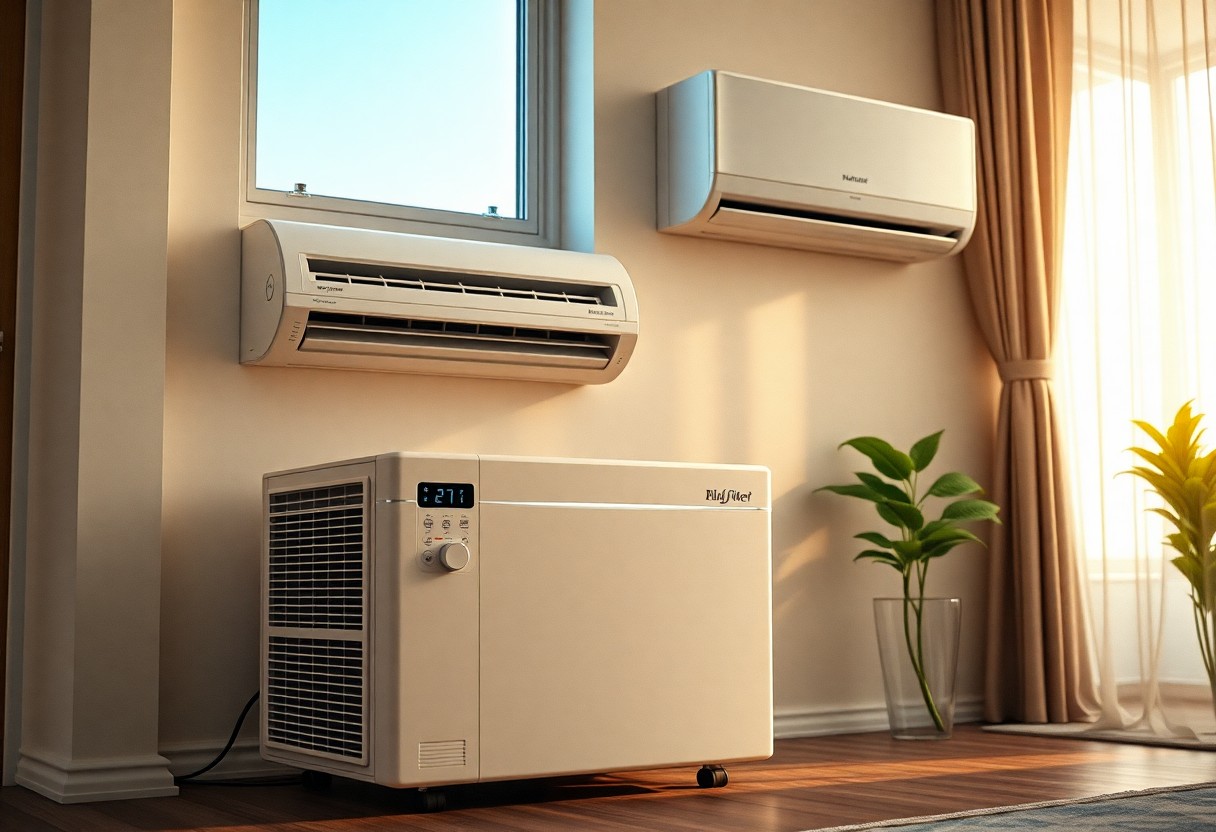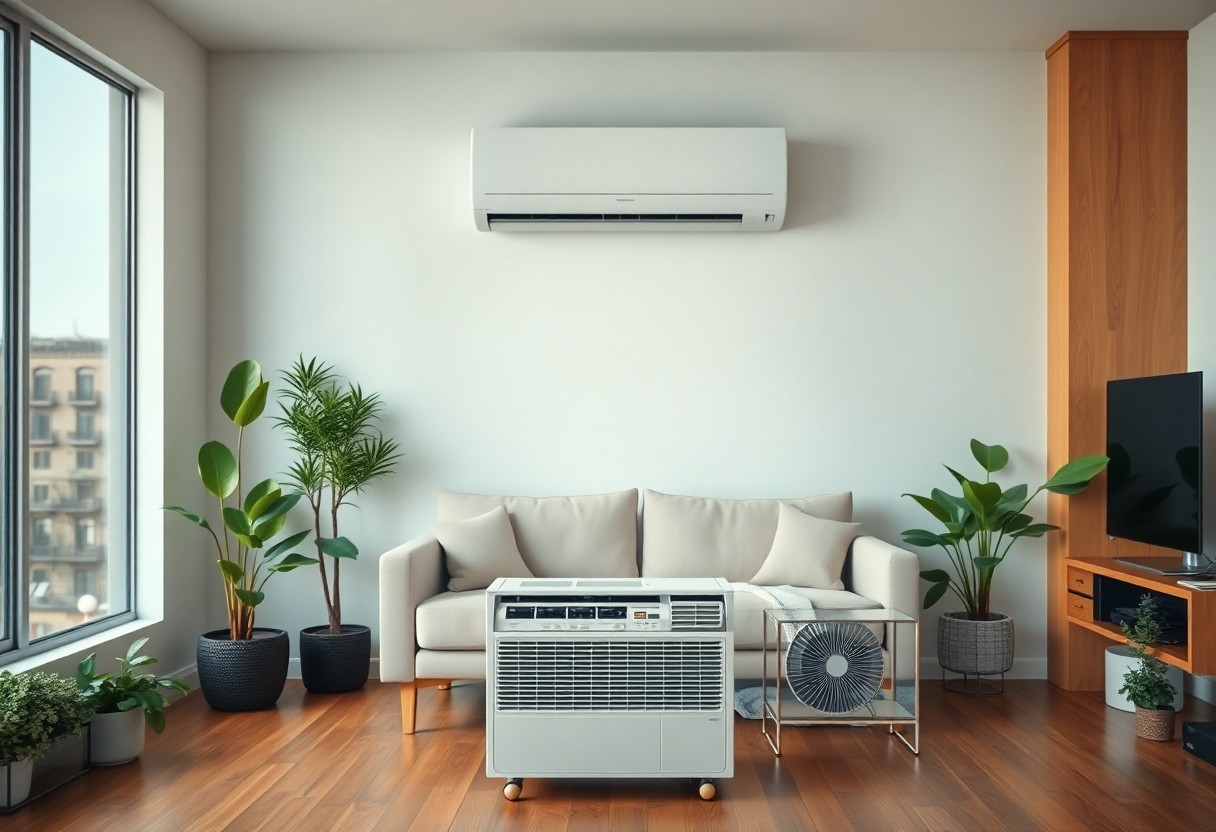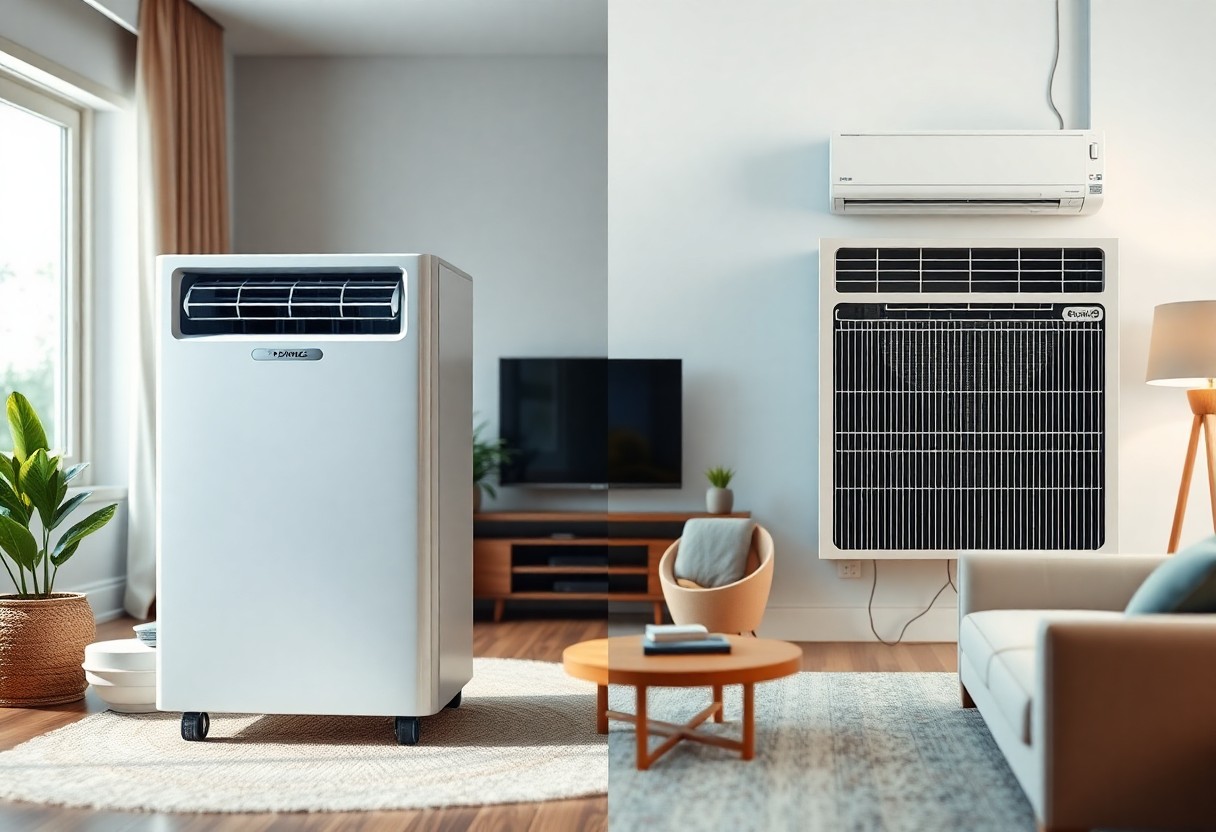Portable vs Fixed Air Conditioning for Rental Properties
Just as you consider the comfort of your tenants, choosing the right air conditioning system for your rental property can significantly impact their experience. Portable and fixed air conditioning systems each have their advantages and limitations, making it imperative to evaluate your property’s needs, budget, and tenant preferences. This guide will help you weigh the pros and cons of each option, ensuring you make an informed decision that enhances both comfort and value for your rental property.
Key Takeaways:
- Portable air conditioners offer flexibility, can be moved between rooms, and do not require permanent installation.
- Fixed air conditioning systems provide more efficient cooling for larger spaces and have a longer lifespan.
- Rental properties may have restrictions on permanent installations, making portable options more viable for tenants.
- Energy consumption and cost of operation can vary significantly between portable and fixed units.
- Maintenance requirements differ, with fixed systems generally needing professional servicing while portable units can be self-maintained.
Assessing the Impact of Climate on Air Conditioning Choice
Climate plays a vital role in determining the type of air conditioning system that best suits your rental property. Understanding local weather conditions can guide your decision, ensuring that tenants remain comfortable regardless of external temperatures. Factors such as humidity levels, temperature fluctuations, and seasonal variations impact not only the efficiency of cooling systems but also operational costs. By tailoring your air conditioning solution to your region’s climate, you enhance tenant satisfaction and preserve the value of your rental investment.
Regional Weather Patterns and Air Conditioning Needs
Different regions experience unique weather patterns that dictate air conditioning requirements. In humid climates, for example, properties benefit from dehumidifying systems to manage moisture, while arid areas may require purely cooling solutions. Coastal regions often face saltwater corrosion issues, necessitating specific installations to mitigate damage. Analyzing the predominant weather conditions in your locality helps refine your choice of air conditioning, creating an inviting and responsive environment for tenants.
Seasonal Variations in Rental Property Demand
Fluctuations in rental demand throughout the year significantly influence air conditioning choices. Properties in vacation hotspots may experience peak demand during the summer months, driving the necessity for effective cooling systems to accommodate short-term renters. Conversely, properties in colder regions may see decreased demand during winter, allowing for fixed systems that can be less frequently utilized. Understanding these patterns enables you to plan accordingly and optimize air conditioning solutions that meet tenants’ needs based on occupancy trends.
During peak rental seasons, particularly in warm climates, air conditioning is often a decisive factor for tourists and seasonal renters. High demand can justify the installation of more advanced or fixed air conditioning systems, which, despite a higher initial investment, deliver better efficiency and comfort. Conversely, in off-peak months, you might find more favorable rental conditions with portable air conditioning units, providing flexibility without significant expenditure. Tailoring your air conditioning strategy to align with seasonal trends not only improves tenant satisfaction but also maximizes your rental income potential year-round.

The Cost-Benefit Analysis of Portable Air Conditioning
Evaluating the cost-effectiveness of portable air conditioning requires consideration of both initial expenses and long-term benefits. While these units may have a higher upfront cost compared to other options, their mobility and ease of installation can lead to significant savings over time, especially in rental scenarios where you might not be staying long-term.
Initial Investment and Long-term Savings
Portable air conditioners generally range from $200 to $600, factoring in installation simplicity. You save on labor costs associated with fixed units. Over time, lower maintenance needs and the ability to cool only occupied rooms can lead to substantial energy savings, making the initial expense worthwhile.
Energy Efficiency and Operational Costs
Energy efficiency ratings significantly impact the operational costs of portable air conditioners. Many models feature EER (Energy Efficiency Ratio) ratings that range from 8 to 12, indicating lower energy consumption. By strategically using these units in high-traffic areas, you can further decrease electricity bills, enhancing overall savings.
With the average portable air conditioner consuming about 900 watts, it’s vital to compare this power usage against local electricity rates. For instance, if your rate is $0.12 per kWh, running a 900-watt unit continuously could cost around $97 over a month, assuming heavy use. Choosing Energy Star-rated models can lead to reduced costs with optimized performance, allowing you to cool efficiently without excessive spending.

Fixed Air Conditioning: A Long-term Rental Solution
Fixed air conditioning systems provide a reliable, efficient solution for rental properties, appealing to both landlords and tenants demanding comfort. These systems often improve property value and attract quality tenants, especially in regions with extreme temperatures. Designed for long-term use, fixed air conditioners deliver consistent performance, ensuring indoor climate control year-round, which satisfies tenant expectations for a durable living environment.
Installation Process and Associated Costs
The installation of fixed air conditioning typically involves planning, electrical work, and potential ductwork adjustments, depending on the property’s layout. Costs for this process can range from $2,500 to $7,500 or more, influenced by factors such as system type and installation complexity. While the upfront investment is higher compared to portable units, the long-term energy savings and potential rent increases can offset these initial expenses.
Advantages for Both Landlords and Tenants
For landlords, installing fixed air conditioning systems can lead to higher property values and demand. Tenants benefit from enhanced comfort and typically lower energy bills, fostering long-term leases. This symbiotic relationship between landlords and tenants makes fixed systems appealing, with both parties enjoying significant advantages in their respective roles.
Long-term benefits include reduced tenant turnover and satisfaction, resulting in a stable rental income stream for you as a landlord. Tenants appreciate the reliability of fixed air conditioning, with many willing to pay a premium for properties equipped with these systems. Energy efficiency ratings often improve, translating into lower utility bills and a more sustainable living environment, further appealing to eco-conscious renters. This investment creates a win-win scenario, promoting a harmonious rental experience and ensuring your property remains competitive in the market.
Flexibility versus Permanence: The Tenant’s Perspective
Understanding the balance between flexibility and permanence is key for tenants evaluating air conditioning options. Many renters prefer portable units for their ability to adapt to changing circumstances—such as moving to a new location or altering their living space. In contrast, those who seek stability and long-term comfort may favor fixed units, which often provide more reliable cooling and energy efficiency, albeit with a commitment to the property.
Tenant Preferences and Lifestyle Considerations
Your lifestyle significantly influences the type of air conditioning system you choose. If you frequently relocate or value the ability to reconfigure your space, a portable unit may align with your needs. Conversely, if you plan on staying in one location for an extended period, investing in a fixed unit could enhance comfort and long-term satisfaction.
The Role of Lease Agreements in Air Conditioning Choices
Lease agreements often dictate air conditioning options available to you. Terms may specify whether you can install a permanent system or if modifications to the property are allowed. Understanding your lease’s stipulations can help you make informed decisions about which air conditioning type is feasible and aligned with your landlord’s policies.
Lease agreements can vary widely, impacting your air conditioning options. Some landlords allow tenants to install fixed systems as long as they are returned to original condition upon move-out, while others may categorically prohibit any alterations. Knowing these specifics helps tailor your air conditioning choice to what is permissible, maximizing your comfort while minimizing potential disputes. Always review your lease terms and discuss openly with your landlord before making any decisions about air conditioning installations.
Maintenance Matters: Comparing Portability and Permanence
| Portable Units | Fixed Systems |
|---|---|
| Generally require less maintenance. | Demand regular professional servicing. |
| Filters can be easily replaced by you. | Components may need specialized tools for servicing. |
| Frequent cleaning keeps performance optimal. | Neglect can lead to costly repairs. |
Ease of Maintenance for Portable Units
Portable air conditioning units often feature user-friendly designs, allowing you to handle basic maintenance like filter cleaning or replacement without professional help. Simply unplugging the unit for a thorough cleaning is often enough to maintain efficiency and air quality. Many models also come with built-in alerts for filter changes, ensuring optimal performance with minimal effort on your part.
Service and Repair Challenges for Fixed Systems
Fixed air conditioning systems present a range of service and repair challenges, largely due to their complexity and the requirement for professional intervention. Regular maintenance needs can lead to scheduling conflicts, as trained technicians are needed to assess system health, clean ducts, and replace parts.
For fixed systems, delays in service can result in long wait times, often during peak demand seasons, leading to discomfort for your tenants. The intricacies of the installation mean that simple tasks, like filter replacements or coolant checks, usually require specialized knowledge. On average, you may expect to pay higher service costs compared to portable units. Additionally, a malfunctioning fixed system can take longer to repair, as waiting for specific parts or components can extend downtime. This can attract negative feedback from tenants and impact your rental property’s reputation.
Final Words
Summing up, choosing between portable and fixed air conditioning for your rental properties depends on your specific needs and circumstances. Portable units offer flexibility and ease of installation, making them ideal for short-term renting. Conversely, fixed systems provide long-term efficiency and comfort, enhancing the property’s value. Evaluate your budget, tenant preferences, and property layout to determine which option will best meet your requirements and attract the right renters, ultimately enhancing your rental experience.
FAQ
Q: What are the main differences between portable and fixed air conditioning units?
A: Portable air conditioning units are movable and can be placed in different rooms, while fixed units are installed in a specific location and require professional installation. Fixed units generally provide more cooling capacity and efficiency compared to portable units.
Q: Which type of air conditioning is more energy-efficient for rental properties?
A: Fixed air conditioning units typically offer better energy efficiency due to their higher capacity and better insulation. They are designed to cool larger areas consistently, unlike portable units that may struggle in larger spaces.
Q: What are the installation requirements for each type?
A: Portable air conditioning units usually require minimal installation, often needing only a window for exhaust. Fixed air conditioning units necessitate professional installation, which may involve ductwork or wall mounting, and can be more time-consuming and costly.
Q: How do maintenance needs compare between portable and fixed units?
A: Portable air conditioning units require regular emptying of water tanks and cleaning of filters, while fixed units often have built-in drainage and may need less frequent maintenance. However, fixed units may require professional servicing for duct cleaning and repairs.
Q: Which option is better for short-term rentals?
A: Portable air conditioning units are often preferred for short-term rentals due to their flexibility and ease of transport. They can be moved to accommodate different guest needs, while fixed units require commitment and are less adaptable.
